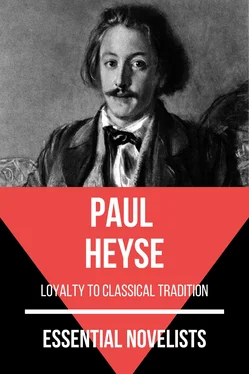"Will you have the kindness to explain this scene, Fräulein?" he asked in a voice from which every trace of agitation seemed to have vanished. As she did not immediately reply, he continued:
"May I hope that you will introduce me to this count, who apparently has some right to compel you to read his letters?"
She was still silent. At last she timidly raised her eyes and gazed at him beseechingly. The look penetrated to his inmost soul.
"If I beg you to ask me no farther questions, to trust me as before—"
"I should not refuse your request," he answered dejectedly, "but I should take leave of you at once—never to return."
"And why?"
"Because I do not desire to visit in any house in the capacity of a guest, without knowing who is the head of it. I do not wish to expose myself to the possibility of having the master instead of the servant, appear before me someday, and hearing that it does not suit his pleasure that you—should receive gentlemen visitors."
She seemed to reflect a moment.
"You're right, my friend," she now answered. "I owe it to you to explain all this, or rather I owe it to myself. What must you think of me? But I will not relate this long and sorrowful story to-day, or here in this place. Besides, your visit has already been greatly prolonged; it will soon be dark. Come to the gold-fish pond in the Thiergarten, where the statue stands, at eleven o'clock to-morrow morning. It's very lonely there then; I've often sat under the trees with a book at that hour and not see three people pass. In that spot I will tell you all. If the charm our game of hide and seek has had, vanishes as soon as you know your friend's very commonplace and prosaic story—you yourself have willed it to be so. But that you may have a pledge of my sincerity at once—take this unlucky note away with you and keep it for me until to-morrow. We will read it together—"
She rose and extended her hand, which, absorbed in gloomy thoughts, he grasped and held firmly in his own. "I need no pledge," he replied. "Perhaps it would be best if I—"
"If I should bid you farewell forever," he was going to say. But he had not the courage to do so. He gazed into her eyes, which were again as unclouded, nay, which sparkled as brightly as ever, and mechanically he took the little note she held out to him. Then he bent over her hand and kissed it—long and passionately; it was the first time he had ever pressed his lips to her cool, soft fingers.
"To-morrow!" said he. "Keep your promise!"
"And suppose that the skies should fall during the night," she answered smiling. "But sleep calmly. What I have to say to you, is only worth knowing because you are still ignorant of it. Oh! my friend, I fear you will yet regret having destroyed the spell by your question, if from to-morrow the fairy tale is ended and Cinderella again sits in the ashes!"
––––––––
WHEN, SOON AFTER, EDWIN returned home, passed Christiane's door, behind which he heard loud, eager voices, and climbed the dark stairs, he was glad that neither Mohr's nor Franzelius' voice could be distinguished in the "tun." He was longing for an hour alone with his brother, and therefore the surprise was all the more unwelcome when he found Balder with his usual companions. Mohr was sitting opposite him before the chess board, which they had placed on one corner of the turning lathe, to take advantage of the last fading daylight. He had set a bottle of Rhine wine—a small stock of which he had stored in the cellar of the house, that he might not drink at the brothers' expense—on the window sill, and seemed so absorbed by the wine, the game, and the smoke of his cigarette, that he scarcely noticed Edwin's entrance. Franzelius was sitting in the middle of the room astride a chair on whose back he had clasped his broad hands, and rested his chin, while his gloomy eyes stared intently at the bust of Demosthenes on the book case. He, too, scarcely turned his head toward the new comer, and the greeting he vouchsafed him sounded more like the growl of a watch dog, than any human tone.
Edwin was no more disposed to talk. He stood behind his brother's chair a moment, stroked his thick hair several times, and then went to his desk, where he apparently began to read the newspapers. Once, however, he turned toward the chess players and said: "It would probably be better, Heinrich, if you would sacrifice your tobacco, which smells horribly, on the altar of friendship. The time for open windows is over, and Balder has already coughed three times."
Mohr instantly opened the window and tossed the cigarette into the courtyard.
Then all four were silent, until Balder rose saying: "A wooden king can't be expected to be checkmated more than five times. Besides, it's a hopeless task to play with you. You're a master of the art."
"Then I am good for something!" laughed Mohr scornfully as he tossed the little pieces Balder had turned into the box. "Master of an art in which persons of the least brains are often the greatest virtuosos. Nay, it is still a question whether a talent for chess is not a sort of disease, a hypertrophy of the power of conbination. You see, Edwin, I, for instance—if this organ were in a normal state—should have made more progress in my play. I plan the finest chess problems through five acts, and when I afterwards examine them narrowly, they are mere wooden figures, no living creatures. Basta! I vow not to touch knight or bishop for a month, until I have arranged my comedy."
He emptied his glass and then slowly poured the remainder of the wine from the bottle into it. "Good evening, Edwin," said he. "We've not had the pleasure of seeing you in the 'tun,' for a long time. Even to-day your thoughts seem to be far away—like our worthy philanthropist's, who has not spoken ten words since he's been here."
The printer rose from his seat with a violent jerk, passed both hands through his bushy hair and said: "It's true: I'm perfectly aware that I've long been a tiresome guest here. Therefore—and for one other reason—I hope our feelings are still the same—"
"What fancy have you taken into your head now?" said Edwin, still absorbed in his newspaper.
Balder had limped up to Franzelius and grasped his hand. "I was going to ask you, Reinhold," he said in an undertone, "to come some day in the morning; you will then find me alone, and I should like to say something about your last essay—"
The other turned away. "No," he muttered, "it's better so, wiser to put an end to this once for all. I'm glad Edwin is here too. I wanted to say it before, but you were so absorbed in the game: I shall take leave of you to-day—for an indefinite time—"
"Fools call it forever," quoted Mohr. "What devil has taken possession of you, Caius Franzelius? Do you want to found a colony of workmen among the red-skins on the Schultze—Delitz'schen principles? Or are you going to the Salt Lake of Utah, to disgust the Mormons with their immortality! Or—stop, now I have it—he can't endure the sight of a man who drinks Rhine wine, while the camels in the desert of Sahara often cannot get even muddy water."
The printer seemed about to make some angry reply. Edwin anticipated him.
"You don't know what you are doing," said he. "If you part from old friends, you must have some good reasons for doing so, for they are wares that are not to be bought in every market. It would be kinder, Franzel, to inform us of these reasons. Who knows whether they're so well grounded, as you imagine."
"I thank you, Edwin," replied the other in a faltering voice. "I'm glad it's not a matter of entire indifference to you whether or not our intercourse is given up, little pleasure as it has afforded during the last few weeks. As for my reasons—"
"I'm quite ready to forsake this locality, if unrestrained intercourse is desired," said Mohr quietly, rising.
Читать дальше












